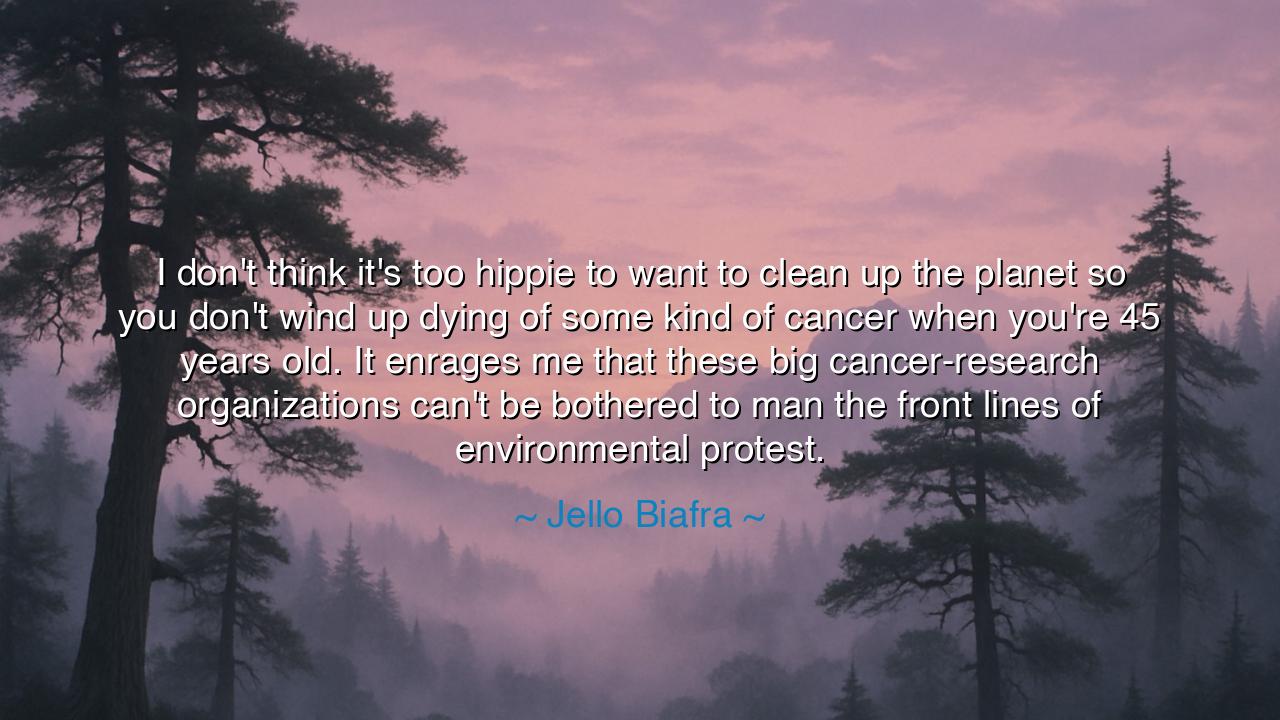
I don't think it's too hippie to want to clean up the planet so
I don't think it's too hippie to want to clean up the planet so you don't wind up dying of some kind of cancer when you're 45 years old. It enrages me that these big cancer-research organizations can't be bothered to man the front lines of environmental protest.






In the rough-hewn voice of a street prophet, Jello Biafra declares a simple righteousness: “I don’t think it’s too hippie to want to clean up the planet so you don’t wind up dying of some kind of cancer when you’re 45 years old. It enrages me that these big cancer-research organizations can’t be bothered to man the front lines of environmental protest.” Beneath the punk snarl stands an ancient ethic: the healer must not only tend the wound; he must also stop the blade. To love life is to fight the sources of harm, not just catalog their consequences.
The saying splits a lazy compromise. One side treats cancer as a private misfortune, best answered in laboratories alone; the other remembers that bodies breathe air and drink water and labor under skies that can either bless or betray them. Cleaning up the planet is not a fashion or a fringe; it is preventive medicine on a civilizational scale. The word hippie here is a foil, a mask we pin on those who remind us of duties we would rather delay. Biafra tears off the mask: protecting the living is not fringe—it is first principle.
He also names a dereliction: when big cancer-research organizations raise banners for cures but not for causes, the public is taught to hope for rescue while the house still burns. Research is holy work; yet holiness without courage becomes ceremony. To stand on the front lines of environmental protest is to insist that rivers unpoisoned and air unchoked are themselves therapies—quiet, daily, universal. What good is a gleaming ward if the neighborhood that feeds it is steeped in toxics?
History has written this truth in aching ink. Think of Love Canal in the late 1970s: families in Niagara Falls discovering that their basements wept chemicals, that miscarriages rose like a dark tide, that cancer and sickness threaded the streets. It was not the great institutions that moved first, but mothers with clipboards, neighbors with petitions, citizens who chained their grief to policy. Their protest pried open hearings, birthed the Superfund law, and taught a generation to trace illness back to its industrial wells. The lab was not enough; the law had to learn.
Another chapter: Woburn, Massachusetts, where trichloroethylene slipped into wells and a cluster of childhood leukemias broke hearts and calendars. The story—told in courtrooms and in “A Civil Action”—was not merely about compensation; it was about causation. Parents did not ask for platitudes about “awareness.” They mapped plumes, confronted factories, and forced the question: who is responsible for the water our children drink? Here again, the front lines were not manned by foundations but by families who refused to separate the environment from the community it sustains.
The lesson is older than punk, older than policy: prevention is the noblest cure. The temple healer of antiquity would sweep the threshold each dawn, knowing that dirt at the door becomes fever in the bed. So too must our healers—scientists, clinicians, charities—sweep at the scale of rivers and refineries, zoning and supply chains. Let the bench and the barricade be friends; let grant reports include victories in emissions reduced and exposures averted. When the healers march with the harmed, knowledge grows legs.
Therefore take up a rule of life both fierce and practical. First, reckon with causes: support orgs that pair research with regulation, medicine with movement. Second, demand disclosure: right-to-know laws, fence-line monitoring, public toxics inventories in plain speech. Third, practice proximity: invite clinicians and scientists to community meetings; invite residents to research design. Fourth, spend like prevention matters: choose products and policies that erase exposures upstream, not just treatments downstream. Finally, refuse the mockery that calls prudence “too hippie.” It is not romance to want your child to grow old; it is reason.
In this spirit, Biafra’s fury becomes a kind of guardianship. Let it enrage us past apathy and into action; let it shame fine institutions into fuller bravery. For the measure of our care is not only in the trials we fund, but in the smokestacks we silence, the pipes we replace, the soils we restore. To clean up the planet is not an anthem for outcasts—it is the common vow of a people who mean to live.






AAdministratorAdministrator
Welcome, honored guests. Please leave a comment, we will respond soon